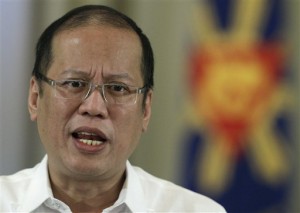Sabah issue is President’s Holy Week agony
MANILA, Philippines—President Benigno Aquino III’s decision to stay home this Holy Week will give him ample time to agonize over the wisdom of reviving the country’s claim to Sabah.
The legal brief on the Sabah claim was submitted by Justice Secretary Leila de Lima to the Office of the President last Friday, and is now awaiting the President’s comments.
Mr. Aquino intends to stay at his official residence by the Pasig River during the Lenten break instead of vacationing in Baguio City, watching religious films, including the musical “Jesus Christ Superstar.”
But with the legal brief now on his desk, the President has to take a hard look at the recommendations of an interagency group he has ordered to “draw up a peaceful [solution] to Sabah claim.”
At a briefing in the Palace on Wednesday, presidential spokesperson Edwin Lacierda confirmed that the report has been placed on the President’s desk.
But he said there was “no decision yet whether to go to international courts” for action.
He could not tell reporters what recommendations the study group had, as he had not seen the paper.
De Lima said on Monday that she had firmed up a government position on the Philippine claim to Sabah and had submitted it to the President.
“It’s a confidential study and I need to get clearance from the President if that can be shared to the public,” De Lima told reporters.
She said the “main questions” were: “Is the claim strong or not and should it be pursued before an appropriate tribunal, and what are the options in light of the current situation?”
The President ordered De Lima, Executive Secretary Paquito Ochoa Jr. and the Presidential Communications Development and Strategic Planning Office to study the legal and historical aspects of the Sabah claim.
He issued the directive following the incursion into Sabah by the sultan of Sulu’s followers last month, which led to a two-week standoff that eventually led to violence and the killings of dozens of Filipinos and about 10 Malaysians.
Besides the historical and legal grounds to validate the assertion of the Sulu sultanate that the Malaysian state of Sabah continues to be part of the territory of the Philippines, the report is expected to recommend the next course of action for the government such as whether to go up to an international court to settle the territorial dispute.
According to Lacierda, the Aquino administration still subscribes to a Palace memorandum that prohibits government officials from calling Sabah as part of Malaysia.
“[Memorandum Circular] 162 stands. That’s the document the DFA (Department of Foreign Affairs) currently uses,” he said.
“I don’t know why some government entities or individuals use or connect Sabah to Malaysia. Obviously, geographically, they are (connected). But we have never said Sabah, Malaysia. It’s always—we have always referred to Sabah as Sabah,” Lacierda said.
The DFA recently reminded all government agencies to stop referring to Sabah as part of Malaysia because of an existing memorandum order issued during the Arroyo regime.
The memorandum was signed on Aug. 20, 2008, by former Executive Secretary Eduardo Ermita “by authority of the President,” referring to then President Gloria Macapagal-Arroyo.
It said that by virtue of Article 1 of the 1987 Constitution on national territory, the Philippines has historical and legal right over certain parts of North Borneo (Sabah).”
The memo said it was “in the national interest to safeguard the country’s historical and legal right in North Borneo (Sabah)” but stressed that the country would strive for a peaceful resolution of disputes with neighboring countries.
The memo directed that “no department, agency, or instrumentality of the Philippine Government shall make any act or statement expressing or implying, directly or indirectly, any recognition of a foreign state’s sovereignty over North Borneo (Sabah) or non-recognition of Philippine title or historical and legal rights to the same.”
It said that reference to Sabah in official documents “should not include its being part of a larger national/federal territory.”
These documents include Philippine passports, agreement, agreed minutes, joint communiqués, record of discussions, and similar documents.

